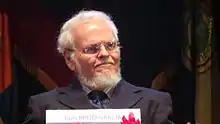Luis Britto García
Luis Britto García (born 9 October 1940, in Caracas[1]) is a Venezuelan writer, playwright and essayist. His fiction has been recognised twice with the Casa de Las Américas Prize, for his works Rajatabla (1970) and Abrapalabra (1979). In 2002 he was the winner of Venezuela's National Prize for Literature, given as a lifetime achievement award. In 2005 he was recognized with the Ezequiel Martínez Estrada honorary award of Casa de Las Américas.[2][3] In April 2012 he received Venezuela's Order of Juan Francisco de León.[4] In May 2012 he was appointed by President Hugo Chávez to the Venezuelan Council of State, "the highest circle of advisers to the president" provided for in the Venezuelan Constitution.[5]
Luis Britto García | |
|---|---|
 | |
| Born | 9 October 1940 Caracas, Venezuela |
| Occupation | novelist, writer |
| Nationality | Venezuelan |
Life
Britto García graduated as a lawyer from the Central University of Venezuela in 1962 and obtained a doctorate in law from the same university in 1969. He obtained a diploma in Latin American studies at the École pratique des hautes études in Paris in 1982. He taught at the faculty of economics and social sciences of the Central University of Venezuela from 1966, becoming a full professor in 1988.[6][7] His non-fiction work includes several historical studies of Caribbean pirates in the early Spanish Empire,[8] including Demonios del mar: corsarios y piratas en Venezuela 1528-1727 ("Demons of the Sea: Corsairs and Pirates in Venezuela 1528-1727").
Britto García is however best known for his fiction. His two best known works are 1970's Rajatabla and 1979's Abrapalabra, both winners of the Casa de Las Américas Prize. Rajatabla is a collection of short stories which are "characterized by humour and irony, [and] refer to political repression and violence".[9] Abrapalabra is a novel "which explores the cultural and political development of Venezuela" in the twentieth century.[9]
Partial bibliography
Fiction
- Los fugitivos y otros cuentos (1964). Caracas: Pensamiento Vivo.
- Vela de armas (1970)
- Rajatabla (1970) - Casa de Las Américas Prize (1970)
- Abrapalabra (1979) - Casa de Las Américas Prize (1979), Monte Ávila Editores - Premio Municipal del Distrito Sucre, Caracas (1980).[10]
- La orgía imaginaria o Libro de utopías (1983). Caracas: Monte Ávila Editores
- Me río del mundo (1984)
- Pirata (1998)
- Andanada (2005) - "2006 Premio Nacional del Libro (Venezuela), categoría Mejor libro de autor venezolano en el extranjero".[11] Barcelona: Thule Ediciones, ISBN 84-933734-2-7
- Pare de sufrir (2006). Caracas: Biblioteca Últimas Noticias
- Arca (2007). Caracas: Seix Barral Biblioteca Breve
Non-fiction
- Ciencia, tecnologia, y dependencia (1975)
- La máscara del poder: del Gendarme Necesario al Demócrata Necesario (1988)[12] Caracas: Alfadil Ediciones
- El poder sin la máscara: de la Concertación Populista a la Explosión Social (1990)[11] - Premio Municipal de Literatura, Mención Ensayo[7]
- El imperio contracultural: del rock a la posmodernidad (1991)
- Demonios del mar: corsarios y piratas en Venezuela 1528-1727 (1999)
- Elogio del panfleto y de los géneros malditos (2000)[11] Mérida: Editorial Libro de Arena
- Golpe de gracia (2001)
- País de petróleo, pueblo de oro (2003)
- Por los signos de los signos (2006)
- Socialismo del Tercer Milenio (2008), Monte Ávila Editores
- El pensamiento del Libertador (2010)
- Dictadura mediática en Venezuela (2012), Ediciones Correo del Orinoco, ISBN 978-980-7426-19-0 - Casa de las Américas' Ezequiel Martínez Estrada Essay Prize.
References
- Rajatabla Archived 2013-05-21 at the Wayback Machine (2007), Monte Ávila Editores, p219
- biografiasyvidas.com, Luis Britto García
- (in Spanish) AVN, 16 March 2012, Abrapalabra es la primera novela de la Colección Luis Britto García
- (in Spanish) AVN, 19 April 2012, Luis Britto García recibe Orden Juan Francisco de León
- Mariano Castillo, CNN, 3 May 2012, Chavez council stirs succession speculation
- (in Spanish) Ultimas Noticias, 2 May 2012, Perfiles: Los consejeros del Estado "a fondo" Archived 2016-03-05 at the Wayback Machine
- Rajatabla Archived 2013-05-21 at the Wayback Machine (2007), Monte Ávila Editores, p222
- (in Spanish) corneta: semanario cultural de caracas, 17–23 February 2011, Luis Britto García Archived 2016-03-03 at the Wayback Machine
- Dinneen, Mark (2004), "Luis Britto García", in Encyclopedia of Latin American and Caribbean Literature, 1900-2003, Balderston, Daniel and Gonzalez, Mike (eds. 2004), Routledge, p87
- Rajatabla Archived 2013-05-21 at the Wayback Machine (2007), Monte Ávila Editores, p221
- Thule Ediciones, Andanada
- Knox, Paul (December 8, 1988). "Style means a lot in populist leaders". The Globe and Mail.
External links
- (in Spanish) Britto Garcia blog
- (in Spanish) Britto Garcia contributions at aporrea.org
- (in Spanish) Long bibliography
- (in Spanish) mcnbiografias.com, Britto Garcia